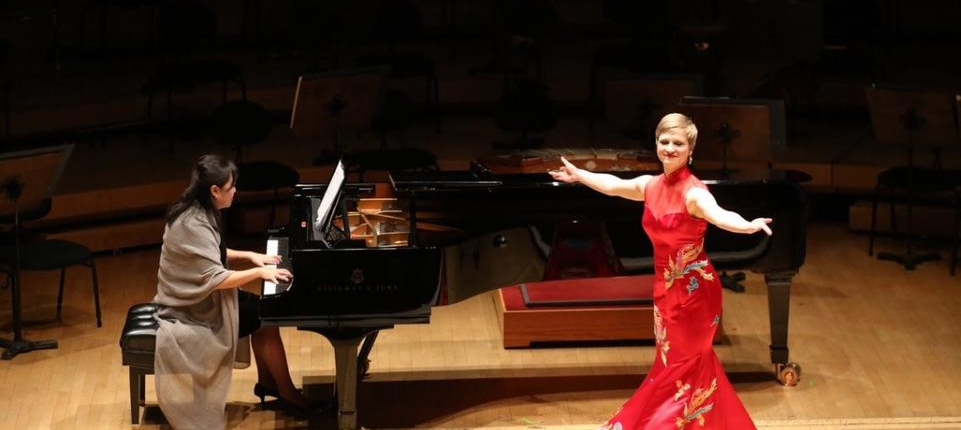Juliet Petrus
The International Language: Using Song to Connect China and the West
By: Juliet Petrus

As a child growing up in Farmington, Michigan, I never would have believed that my life’s work would become about using classical music to connect China and the Western world. When I was a girl, the extent of my exposure to Chinese culture was books about feng shui, “Buddhism for Dummies,” and learning how to use chopsticks at the only Chinese restaurant in my town. I had always had a curiosity for other cultures and languages. I first traveled to Europe when I was thirteen singing with an international choir. I came home “changed,” according to my parents, and profoundly interested in learning how to communicate in foreign languages. That next school year, I began studying French, later adding German and Italian in my university years.
My degrees, however, are not in linguistics. I am, by study and profession, an opera singer. I made it well into my adult life before finally meeting the subject that would capture my full interest and drive my professional life for nearly a decade: China.
In 2011, I applied for and was accepted into an innovative program for young, Western opera singers. iSING Beijing was the first program of its kind to bring Western, classical singers to China, teaching them about Chinese language, culture and music. For five weeks, we took Chinese language classes for four hours a day. It was there that I learned how to speak and to write in pīnyīn. I heard fascinating lectures by Peking opera singers, professors of Chinese language, and a variety of other specialists, sparking my enthusiasm. I saw places like Tiananmen Square, the Summer Palace, and The Great Wall. I remember feeling so alive, so overcome with joy for everything that I was experiencing for the first time. But, none of that could prepare me for what was about to come.
The finale of our five weeks was to be a performance at the National Center for the Performing Arts in Beijing. My career to that point had been singing opera in the United States and Europe. While there are many enthusiastic lovers of opera there, nothing compared to the palpable energy buzzing in the hall that day in Beijing. When I stepped onstage and sang the opening lines to “I Love You, China,” the audience erupted in deafening applause and enthusiastic exclamations of “Hǎo! Hǎo!” in the middle of my solo. I had suddenly been transformed from opera singer… to rock star.
What made it all the more meaningful was that, after the concert when a wave of people rushed onto the stage for photos, I had gained the knowledge to have even the most basic of conversations with them: “Rèn shi nǐ hěn gāo xìng!” I could communicate in music and in Chinese.
I went back to Beijing in December 2011 for another concert with iSING. The Beijing winter was brutally cold, but looking down at the street from the hotel, I still saw the swarms of motorbikes and bicycles zigging and zagging on the street below. I related to and understood the tenacity, work ethic and determination of the Chinese people. The language, culture and music provided endless inspiration to me. As I looked out that window, I declared to myself “I need to come here every year for the rest of my life.”
 Perhaps it was saying it out loud that caused it, but the following nine years opened door after door, all of which led me back to China. In 2012, I returned to iSING Beijing for another five weeks, where my language skills and cultural understanding deepened, as well as my enthusiasm for living in China. At the end of that program, I was publicly invited by a representative of Hanban to come and study Chinese in China as a Confucius scholar. I was thrilled — but almost immediately dismissed the idea. I was a married 33-year-old woman with a toddler at home. I could not see how it would be possible to make longer-term study abroad and family happen at the same time. Luckily, thanks to the endless support of my husband and family, as well as the gracious leadership at Tongji University in Shanghai, I was able to take advantage of this incredible opportunity. In 2014, my son and I lived in the dorms at Tongji, while I took classes at the International School and he enrolled at the yòu’éryuán. I learned an incredible amount about Chinese language in that one semester. It was in Shanghai, however, where I began truly combining my career as a singer with my desire to communicate between cultures.
Perhaps it was saying it out loud that caused it, but the following nine years opened door after door, all of which led me back to China. In 2012, I returned to iSING Beijing for another five weeks, where my language skills and cultural understanding deepened, as well as my enthusiasm for living in China. At the end of that program, I was publicly invited by a representative of Hanban to come and study Chinese in China as a Confucius scholar. I was thrilled — but almost immediately dismissed the idea. I was a married 33-year-old woman with a toddler at home. I could not see how it would be possible to make longer-term study abroad and family happen at the same time. Luckily, thanks to the endless support of my husband and family, as well as the gracious leadership at Tongji University in Shanghai, I was able to take advantage of this incredible opportunity. In 2014, my son and I lived in the dorms at Tongji, while I took classes at the International School and he enrolled at the yòu’éryuán. I learned an incredible amount about Chinese language in that one semester. It was in Shanghai, however, where I began truly combining my career as a singer with my desire to communicate between cultures. 
During my time at Tongji, I gave my first solo concert singing Chinese repertoire. I was once again struck by the connection with the audience. I knew that it was the music that allowed me to speak with the people watching, and I knew that it was a conversation I wanted to start back home. In 2015, I recorded my first CD of Chinese and American art song. A Great Distance was a love letter to the music that I had grown up loving as a young classical singer and to the music which had captured my heart. I believed then, as I do now, that Chinese vocal music deserved to be known internationally.
After that, my time in China increased to nearly six months out of every year. I began receiving invitations from Chinese conservatories to perform and give masterclasses. In 2018-2019, I completed a ten-city, solo recital tour of China, a recital aptly named “Juliet: The ‘I Love You China’ Tour.” I could not imagine a truer title.
After Tongji, my desire to continue improving my language skills never ended. While the ability to go and spend an entire semester became more difficult with professional and familial obligations, I continued to study online, sometimes coming to China when I could to study privately. In 2017, I passed the HSK4 exam. These days, I am actively studying to pass the HSK5 before the end of the year.
Perhaps my proudest accomplishment comes in the form of an idea that I had back in my first summer in China. During that time, I spoke with one my mentors, Katherine Chu, a director of the iSING Beijing program, who I knew shared my passion for education.
“Katherine, I want to write a Chinese diction book.”
A diction book is a book used in many Western music conservatories to teach singers how to pronounce a language, even if they cannot speak it fluently. It is an acute analysis of sounds, application of the International Phonetic Alphabet, and systemization of teaching.
“That’s nice,” she replied smiling. “Why don’t you learn more Chinese, spend more time in China to get to know the people and the culture and then come back to me.”
She knew that, back in 2011, I had no business saying this despite my enthusiasm. So, I spent the next eight years gaining that knowledge.
In early 2019, Katherine and I signed a contract to co-author Singing in Mandarin: A Guide to Chinese Lyric Diction and Vocal Repertoire to be released by the publisher Rowman and Littlefield in July 2020. Finally, the classical singing world will have a guide to Chinese vocal music. I hope that this book will help begin the conversation of bringing Mandarin forward as a new ‘lyrical language,’ a language used in singing much like Italian or German. Likewise, I hope that it will allow for the printed music, much of which is currently only available in China, to be made available in the West using the transliteration guidelines introduced in the book. This music may finally be made accessible for a worldwide audience.
It was initially the rush of being on stage that drew me into Chinese music, language and culture. But as the years have passed, as my relationship with China, its music, language and people has grown, it has become about how I can use my first language — music — to connect my first and second home. When words and circumstances create division, it is still my hope that song can span continents to connect hearts.
Juliet Petrus
Juliet Petrus is an American and Italian professional opera singer born and raised in Michigan and currently based in London, UK. Since completing her degrees in voice performance at the University of Michigan and Northwestern University, she began working professionally as a coloratura soprano across the US and Europe. In Western music, she frequently performs roles in baroque and Mozart repertoire, including The Queen of the Night, The Magic Flute (Hamburger Kammeroper, Germany), and is frequently the soloist for Carmina Burana (Alabama, St. Louis and Colorado symphonies). Next season, she sings with Florentine Opera in Milwaukee and with Bühne Baden in Baden, Austria.
In 2011, she was invited to participate in the program iSING! Beijing (now iSING! International Young Artists Program), which was her first exposure to Chinese language, culture and music. After being the recipient of a Confucius Institute Scholarship in 2014 to attend Tongji University in Shanghai, she began to specialize in contemporary Chinese vocal literature. Her performances in China have taken her to more than twenty cities, and include performances for CCTV, at the Great Hall of People in Tiananmen Square, the National Center for the Performing Arts in Beijing, with the Shanghai Symphony, and solo recital performances across the Dongbei region. In the US, she has sung in Mandarin at Lincoln Center in New York, Chicago Symphony Hall, and Shubert Theater in San Francisco. In 2015, she was the first Westerner to release a CD of Chinese art song, entitled A Great Distance千里之外 on MSR Classics, which can be found on Spotify, Amazon, and iTunes.
Juliet is likewise a passionate educator. In addition to being a teaching artist for Lyric Opera of Chicago for over seven seasons, Juliet was an associate professor of voice, piano and viola for the City Colleges of Chicago. Across China, she is a welcomed lecturer and masterclass teacher, having worked with students at conservatories in Harbin, Shenyang, Beijing, Nanjing, Jinan, Chengdu, among others. Since the beautiful world of Chinese music was opened to her, she has become particularly interested in making Chinese music accessible for Western singers. Her book with co-writer Katherine Chu, Singing in Mandarin: A Guide to Chinese Lyric Diction and Vocal Repertoire (Rowman and Littlefield, 2020) will be released later this year.
Juliet is fluent in English, German, Italian, French and Mandarin, and she currently maintains an online studio of music and language learners across three continents. When not performing, teaching, or studying, Juliet loves exploring new cultures through cooking, watching movies, and traveling with her husband and son. She truly believes in the power of music to unite people and cultures around the world.

